Co-founders, Bella Banbury and Tracy Lloyd, weigh in on what matters in brand strategy today.
It’s important to remember that, in the end, the age-old question is always the same. Client needs all come down to “How do we differentiate our brand?” It’s just the way people ask the question and the way we answer the question that evolves. Here’s what we’ve been seeing more specifically in the market:
1.Heightened attention around data security:
Since 2016 was all about using data, now it’s all about safely storing and accessing that data. Gartner predicts that by 2018, 50% of business ethics violations will be related to data. There’s lot of questions and doubts about how brands are collecting information and keeping it safe. People are distrustful and worried about privacy issues. Smart brands are focused on security and smart storage. And those brands that can keep data safe, and their users even safer, are winning.
2. Even greater demand for trust:
Companies with a culture of trust have outperformed the S&P 500 by a factor of three, and high-trust companies are more than 2½ times more likely to be high performing revenue organizations than lower-trust companies. Nothing is as important as trust for any brand looking to make an impact moving forward. In 2016, we saw a lot of brands lose people’s trust, both internally and externally, in banking, in technology, in the automobile industry, and in the food industry. So this year a lot of brands are working on building and keeping trust this coming year. And this effort always comes back to brand strategy – helping brands make promises that they can keep to both build and keep the trust earned. That’s what we do.
3. Purpose divides:
The conversation around purpose-led business continues. There is more and better research coming out that supports the ideas of purpose-led business and the research supports our belief. When companies articulate and embrace a meaningful purpose or vision, their people naturally pay more attention to all the elements that drive sustainable growth. Brands that want genuine purpose to fuel innovation, culture, and business need to make sure they live authentically by it and communicate it clearly.
4. It’s all about disruption:
It’s clear that people are drawn to brands that are challenging the status quo, saying something new, and making a splash today. Whatever is it –disrupting a category, challenging the way we pay for things, changing the way we get healthcare, the retail experience – it’s all about disruption. Industries we’ve been most excited about are insurance, healthcare, wellness, and education because of this same reason. Brands that reimagine what is possible and deliver new ways of behaving will gain momentum over their competitors who remain stuck in the same thinking.
5. Digital health, on the rise:
There are many changes afoot in wellness and digital health. Last year, we saw more investing in this space and we imagine brands will need to start working harder to differentiate themselves in the next year. Right now, the future seems exciting and yet somewhat vague. This space will require digital health brands to clarify, differentiate, categorize, and tackle shifts head on. The digital health market is huge, and those brands that can figure out how clearly articulate why they matter and deliver on that promise could very well become Wall Street darlings.
6. Role of the CMO changed for good:
The role of the CMO is almost unrecognizable to five years ago. CMOs are now expected to deliver against P&L metrics, grow the top line, and drive the brand forward. Steering the brand in the driver’s seat means delivering on the brand promise. It also means ensuring all customer experiences are aligned to the brand purpose. It’s about understanding the customer journey and embracing customer experiences across all channels. So in order to compete, the CMOs of 2017 need to be brand focused, technically savvy, and data driven. They need to deliver better customer experiences and use insights to strategically deliver business growth.
7. All about brand experience:
Because expectations of brands are continually rising, smart brands are uber-focused on creating meaningful experiences. The real challenge is creating cohesive, connected experiences that resonate across platforms and at every touchpoint. These experiences drive engagement, build loyalty, and drive ROI. And brands need a clear strategy for succeeding in creating the right kind of experiences for the people they are trying to reach. Developing strategies to outline brand behavior has become more relevant for brands looking to deliver something people can count on – whether it’s B2B, B2C, or B2B2C.
As a San Francisco branding agency, we are excited to continue to help our clients develop the right brand strategies to transform brands in order to transform business.
Emotive Brand is a San Francisco branding agency.






Brand = Trust + Transfromative Emotional Experiences
Thanks Whitney. Your thinking always inspires our team.